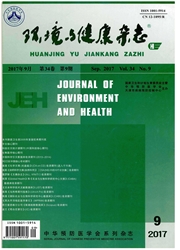

 中文摘要:
中文摘要:
多氯联苯(PCBs)是一类广泛存在于环境中的持久性有机污染物。笔者综述了PCBs的特性及其对动物和人类肝毒性影响的研究进展。已有的研究结果表明,PCBs对动物肝脏有致损害及致癌作用;但对人类而言,除在重大污染事件中发现PCBs可导致人类肝疾病,直至死亡外,职业暴露和环境中长期低剂量暴露实验均未证实PCBs暴露与人类肝脏的损伤及其致癌作用有关。但某些地区人群高肝癌发病率及其环境中PCBs的检出预示着其中有一定的关系,值得深入研究。
 英文摘要:
英文摘要:
Polychlorinated biphenyls(PCBs) is one of persistent organic pollutants which are widely exist in environment. This review described PCBs characteristics and toxicity on animals and human livers. Before now, it was identified that PCBs caused liver damage and hepatocarcinogenieity for animals. However, occupational studies and long-term, low level exposure studies to human beings have found no direct correlation between PCBs exposure and liver damage and careinogenieity, only accidental environmental exposures have found increased mortality of liver disease. But high morbidity of human liver cancer and detected PCBs in the environment were reported in some regions. It is evident that more researches should be done.
 同期刊论文项目
同期刊论文项目
 同项目期刊论文
同项目期刊论文
 Metal nanoparticle-enhanced room temperature phosphorescence of diiodofluorescein on the filter pape
Metal nanoparticle-enhanced room temperature phosphorescence of diiodofluorescein on the filter pape The effects of LMWOAs on biodegradation of multi-component PAHs in aqueous solution using dual-wavel
The effects of LMWOAs on biodegradation of multi-component PAHs in aqueous solution using dual-wavel In situ monitoring the photolysis of fluoranthene adsorbed on mangrove leaves using fiber-optic fluo
In situ monitoring the photolysis of fluoranthene adsorbed on mangrove leaves using fiber-optic fluo 期刊信息
期刊信息
